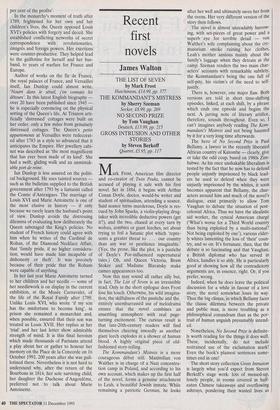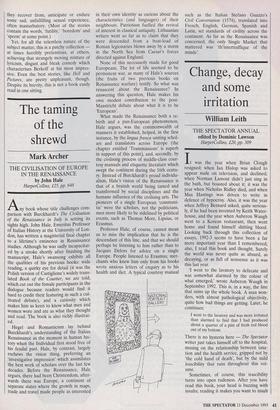Recent first novels
James Walton
Mark Frost, American film director and co-creator of Twin Peaks, cannot be accused of playing it safe with his first novel. Set in 1884, it begins with Arthur Conan Doyle, doctor, would-be writer and student of spiritualism, attending a seance. Said seance turns murderous, Doyle is res- cued by John Sparks, a violin-playing drug- taker with incredible deductive powers (get it?), and the two, chased at every turn by wolves, zombies or giant leeches, set about trying to foil a Satanic plot which 'repre- sents a greater threat to . . . our country than any war or pestilence imaginable.' (Yes, the prose, like the plot, is a pastiche of Doyle's Poe-influenced supernatural tales.) Oh, and Queen Victoria, Bram Stoker and Madame Blavatsky make cameo appearances too.
Now this may sound all rather silly but, in fact, The List of Seven is an irresistible read. Only in the short epilogue does Frost lose his touch. Otherwise, his wild imagina- tion, the skilfulness of the pastiche and the entirely unembarrassed use of melodrama ensure that the novel combines an unsettling atmosphere with real page- turning excitement. The curious result is that late-20th-century readers will find themselves cheering inwardly as another giant leech explodes in a shower of human blood. A highly original piece of old- fashioned story-telling.
The Kommandant's Mistress is a more courageous debut still. Maximilian von Walther is in charge of a Nazi concentra- tion camp in Poland, and according to his own account, which makes up the first half of the novel, forms a genuine attachment to Leah, a beautiful Jewish inmate. While remaining a patriotic German, he looks
after her well and ultimately saves her from the ovens. Her very different version of the story then follows.
The novel is almost unreadably harrow- ing, with set-pieces of great power and a superb eye for terrible detail — von Walther's wife complaining about the cre- matorium smoke ruining her clothes, Leah's mother anxious mainly about the family's luggage when they detrain at the camp. Szeman renders the two main char- acters' accounts with remarkable subtlety, the Kommandant's being the one full of self-pity, his victim's of the need to self- justify,
There is, however, one major flaw. Both versions are told in short time-shifting episodes, linked, at each shift, by a phrase which ends one episode and begins the next. A jarring note of literary artifice, therefore, sounds throughout. Even so, I can't imagines anybody reading The Kom- mandant's Mistress and not being haunted by it for a very long time afterwards.
The hero of No Second Prize is Paul Bellamy, a lawyer in the recently liberated African country of Katombe — clearly, give or take the odd coup, based on 1980s Zim- babwe, As his once unshakable liberalism is tested by the fact that he now has to defend people unjustly imprisoned by black lead- ers he used to defend when they were unjustly imprisoned by the whites, it soon becomes apparent that Bellamy, the char- acters around him and much of the novel's dialogue, exist primarily to allow Tom Vaughan to debate the situation of post- colonial Africa. Thus we have the idealistic aid worker, the cynical American charge ('What's worse for a Third World country than being exploited by a multi-national? Not being exploited by one'), various elder- ly whites lamenting the loss of 'their' coun- try, and so on. It's fortunate, then, that the debate is so fascinating and that Vaughan, a British diplomat who has served in Africa, handles it so ably. He is particularly good at showing how all the contradictory arguments are, in essence, right. Or, if you prefer, wrong.
Indeed, when he does leave the political discussion for a while in favour of a love story, the novel somewhat loses its way. Thus the big climax, in which Bellamy faces the classic dilemma between the private and public man, is more troubling as a philosophical conundrum than as the por- trait of human anguish presumably intend- ed.
Nonetheless, No Second Prize is definite- ly worth reading for the things it does well. These, incidentally, do not include restrained use of the exclamation mark! Even the book's plainest sentences some- times end in one!
The short story collection Gross Intrusion is largely what you'd expect from Steven Berkoff's stage work: lots of messed-up, lonely people, in rooms covered in half- eaten Chinese takeaways and overflowing ashtrays, pondering their wasted lives as
they recover from, anticipate or endure some sad, unfu]filling sexual experience, often masturbatory. (Most of the stories contain the words, `futility,' boredom' and `sperm' at some point)
Yet, for all the relentless nature of the subject matter, this is a patchy collection at times horribly pretentious, at others, achieving that strangely moving mixture of lyricism, disgust and bleak comedy which characterises Berkoff at his most impres- sive. Even the best stories, like Hell and Pictures, are pretty unpleasant, though. Despite its brevity, this is not a book easily read in one sitting.



































































 Previous page
Previous page